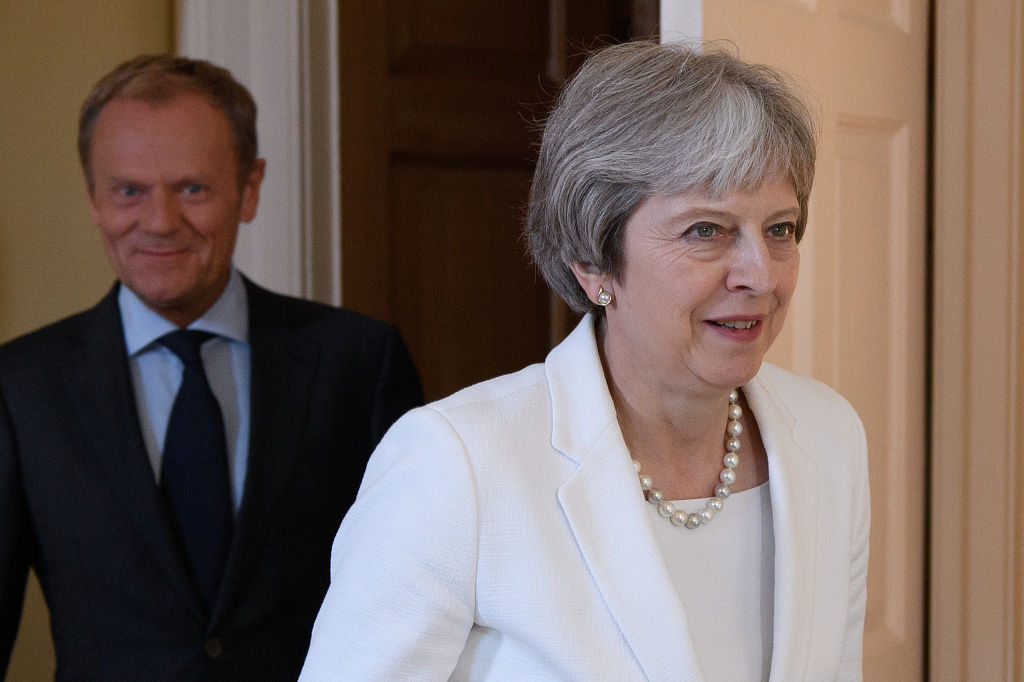Theresa May’s attempt to alter her Brexit deal is going down badly in Brussels. The anger is partly understandable: after all, this is the agreement May’s own government negotiated. Donald Tusk’s barbed comment today – that there is a “special place in hell” for those who promoted Brexit without a plan – can be explained by this frustration. But the EU also needs to face up to the political reality: May’s deal suffered a crushing Parliamentary defeat by 230 votes. It’s all very well having an agreement that works in Brussels theory, but it still has to get through the Commons. If Brussels really wants a deal, it too needs to move; MPs may need to climb down, but the EU can help to provide them with ladders.
This doesn’t mean that Brexiteers don’t need to think again when it comes to the backstop. They need to accept that there are legitimate reasons for its inclusion in the withdrawal agreement and face up to the fact that scrapping it entirely is not going to happen. Theresa May confirmed as much during her visit to Northern Ireland yesterday, when she said that she was looking to amend the backstop, not get rid of it. The Government and MPs need to be realistic about what this means; neither the ‘Malthouse compromise’ nor a unilateral exit mechanism are likely to be runners with the EU. But the biggest political problem with the backstop is the perception that it is a “trap,” designed to keep the UK and/or Northern Ireland inside the EU’s customs and regulatory framework with no way out. Of course, senior EU figures have repeatedly stressed that the backstop is only intended to be temporary. The problem is that many MPs simply do not believe them – particularly when the Attorney General’s legal advice found that “in international law, the [backstop] would endure indefinitely until a superseding agreement took its place.” Addressing this fear of being “trapped” is vital if trust is to be built.
“Alternative arrangements” to the backstop are unlikely to be ready with two months to go. But there is an important distinction here; just because “technical solutions” aren’t ready yet doesn’t mean they will never work at all. The deal already commits both sides to work towards replacing the backstop with “alternative arrangements” in the future. So why not agree a legally-binding protocol, setting out a roadmap for exploring, testing and implementing “alternative arrangements” to the backstop, and establishing objective criteria for what “no hard border” really means on the ground? This would be in the interests of both sides. The UK would obtain a much stronger legal commitment from the EU to work towards alternatives to the backstop. And the Irish would be reassured that any plan B would have to actually work before being implemented.
Additionally, there needs to be a stronger legal guarantee that the backstop is a temporary arrangement. Under EU law, exit negotiations conducted during Article 50 cannot constitute the basis of a permanent future relationship. Yet the existing deal only offers the relatively weak promise that the Withdrawal Agreement “does not aim” at a permanent relationship. The UK should seek to obtain a better guarantee from the EU – again through a binding protocol or ‘mini-treaty’ – that the backstop can only be temporary as a matter of law. This would provide the UK with a valuable tool to challenge the EU if it sought to trap us in the backstop long-term. The alternative would be some sort of time limit, though the UK would need to propose a generous length of time if it wants this to be considered by the EU.
Ultimately, if the EU refuses to engage with the UK’s concerns at all, there is a real risk of a no-deal Brexit in just under two months. While no deal would undoubtedly cause short-term disruption to the UK, it would also be damaging for the EU – and particularly Ireland. It would be a tragic irony if failure to compromise on the backstop, a mechanism designed to avoid a hard border, was to trigger no deal – and therefore a hardening of that very border. To avoid this, both sides should consider the changes we propose at Open Europe. They won’t resolve everything critics of the deal want addressed, but they are realistic ways to deal with the primary concern that the backstop traps the UK in an undesirable long-term relationship.
Dominic Walsh is a Policy Analyst at Open Europe






Comments